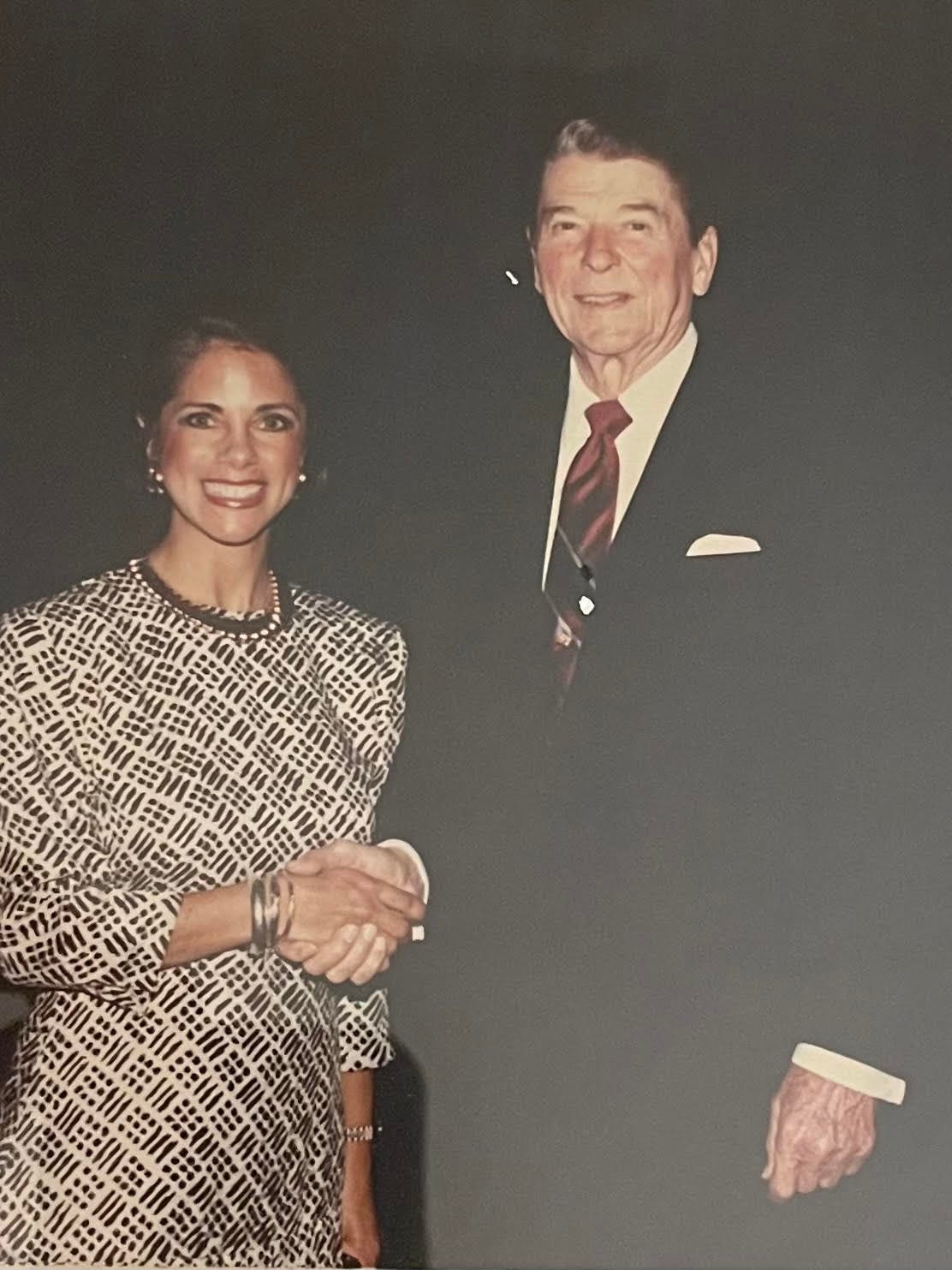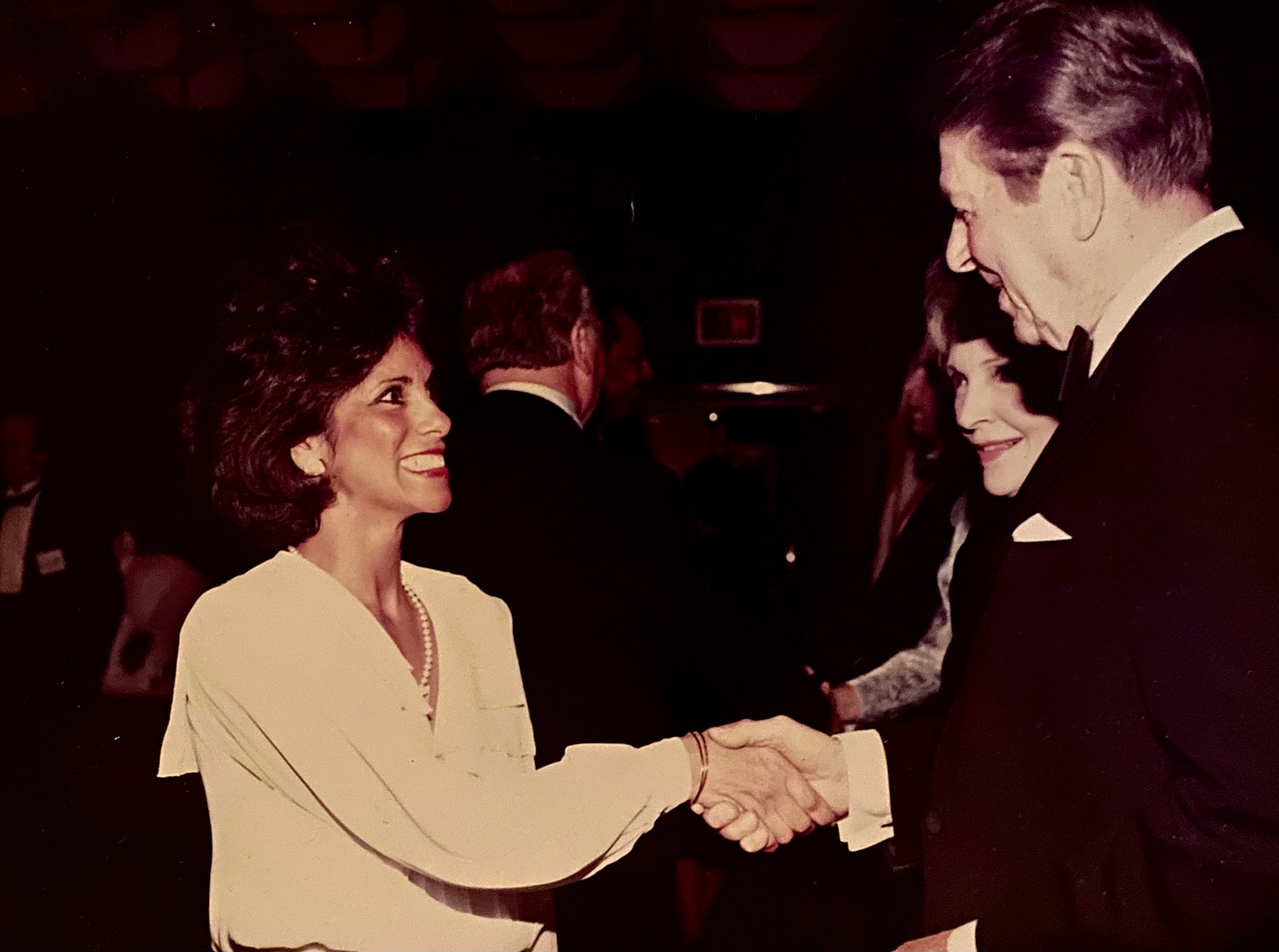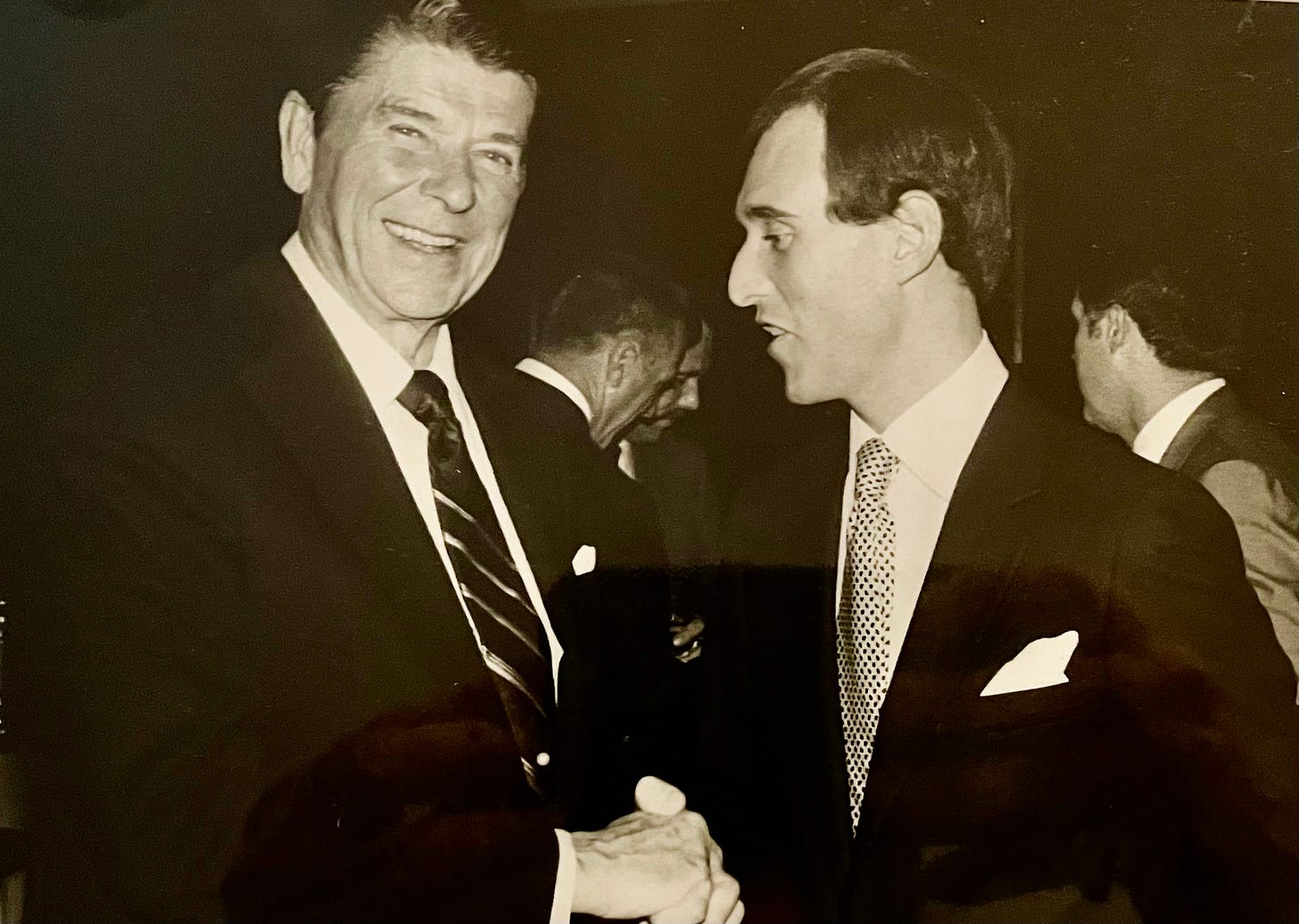REAGAN, The Movie—A Review
As the film ended and the extensive credits began to roll, my wife and I sat in silence as we both sought to hold back our tears for one of America's greatest presidents.
On Monday, September 9th, after recording my daily show, The StoneZONE on Rumble, I did interviews on Infowars, The Kimberly Guilfoyle Show, as well as doing a radio interview with veteran radio host and former Democrat operative Mitch Hank on Mitch in the Morning on 1240 AM and 103.7 FM WHBU in the run-up to Tuesday night's presidential debate. Having done three hours of LIVE radio from 77 WABC Radio's studio in NYC, I had a touch of laryngitis.
I decided to take my wife, Nydia - who I met while working as the Northeast Political Director for Ronald Reagan's 1980 presidential campaign, where she worked as the campaign photographer - to see the movie, REAGAN, starring Dennis Quaid and produced by Mark Joseph. This turned out to be an extraordinarily entertaining and emotional experience for both of us.
This extraordinary film actually manages to capture President Ronald Reagan's ebullient optimism, ardent anti-communism, and deep-seated conservative principles. Seen through the eyes of a retired KGB agent played by Jon Voight, the film is stunningly accurate regarding "The Gipper's" career path from radio, B-movie actor, Screen Actors Guild president, to governor, and then president of the United States.
Dennis Quaid actually manages to capture Reagan's genial nature, athleticism, love of the outdoors, and stubborn resistance to those in his own State Department who urged him to drop his hard line against the Soviets in the interest of détente.
Interestingly, while the movie casts Reagan staffers like Judge William P. Clark Jr, bodyman Mike Deaver, and counsel Edwin Meese, Reagan's rumpled Press Secretary Lyn Nofziger and Reagan's Rasputin-like Campaign Manager John P. Sears have been airbrushed from the narrative.
The movie also completely fabricates the role of Dana Rohrabacher, later a California congressman, in crafting Reagan's most famous speech at the Berlin Wall, where he challenged Soviet leader Mikhail Gorbachev to "tear down this wall."
Not only did Rohrabacher not author the famous line, but Nancy Reagan specifically despised the self-aggrandizing future congressman from Orange County. History, it seems, is written by the winners, or in this case, self-promoters who bullshit the screenwriters.
I first joined Reagan's entourage as the National Director of Youth for Reagan on his 1976 campaign staff when he challenged President Gerald Ford for renomination, rejoining the former governor's staff for his 1980 presidential bid as a Regional Political Director, and returning to reprise that same role with expanded responsibility for New York, New Jersey, Connecticut, and Ohio for his 1984 reelection campaign.
While the movie is historically accurate, I wish there had been greater focus on Reagan's seminal 1976 bid to replace President Ford, in which the former California governor laid the groundwork for Reagan's utter destruction of former ambassador George H. W. Bush and his ultimate nomination and election as president in 1980.
The film would have benefited by including important characters in Reagan's rise like Senator Paul Laxalt of Nevada and the aforementioned John P. Sears.
A nice touch was the inclusion of the portrayal by former teen idol, Pat Boone, who plays an evangelical minister as the film addresses the importance of the rise of the religious right in Reagan's ascendancy. Actor, singer, producer, and director Robert Davi excels in the small but pungent role of Soviet leader Leonid Brezhnev.
Most of the film was shot in Oklahoma due to a then-new tax rebate law launched by the state in 2020, and due to COVID-19 restrictions that were much lighter compared to other states. Filming took place in Oklahoma City, Guthrie, Edmond, and Crescent, Oklahoma. Using CGI and special effects, the Oklahoma City Capitol Building was dressed up to look like the United States Capitol Building, and the Temple of the Scottish Rite of Freemasonry in Guthrie doubled for The White House.
This biopic briefly uses a standard Oliver Stone technique featuring a collage of anti-Reagan pop art created during the anti-war student uprising on the Berkeley campus of UCLA.
The film also fails to accurately put responsibility for the Iran-Contra scandal where it firmly belongs on Vice President George Bush and Reagan's CIA Director, William J. Casey, who fashioned the illegal arms deal to fund the Nicaraguan Contra rebels fighting the Sandinistas after the U.S. Congress cut off funding with passage of the Boland Amendment. It has never been established that this illicit scheme helmed by Bush and Casey, and executed by Colonel Oliver North, was actually carried out with Reagan's knowledge.
Bush's toady biographer, Jon Meacham, failed to mention in his prizewinning biography of Bush that the then-vice president refused to cooperate with a special counsel's investigation of the scandal by refusing to testify or to turn over any records. Those seeking to burnish Bush's reputation at the expense of Reagan have airbrushed this inconvenient fact from history, as well as Bush's role overseeing the trafficking of millions of dollars worth of cocaine into Mena, Arkansas, where a compliant Governor Bill Clinton was bribed to look the other way in the CIA's illegal drug-running operation designed to raise additional "off-the-books" cash for the Nicaraguan Contras. The CIA lawyer overseeing the illegal drug smuggling operation? Future Trump Attorney General William P. Barr.
Friends who had seen the movie warned me of its powerful and emotional ending in which the ever-protective Nancy Reagan, played by Penelope Ann Miller, declines to tell her husband that because of concerns about his age in retirement, he would no longer be allowed to ride a horse—leaving that unpleasant task to Secret Service agent John Barletta, played effectively by Trevor Donovan.
As the film ended and the extensive credits began to roll, my wife and I sat in silence as we both sought to hold back our tears for one of America's greatest presidents. The left has tried with some success to rewrite history by downgrading Reagan's successful eight-year presidency, in which his across-the-board tax cuts created one of the greatest economic booms in American history, and his rebuilding of America's national defense outpaced the Soviets in a arms buildup that would ultimately cause the Iron Curtain to fall.
While Washington establishment elites like Clark Clifford, who ultimately went down for corruption in an international banking scandal, denigrated Reagan as "an amiable dunce," my own experience with Reagan - who I spent more time with than any president other than Richard Nixon - showed me that Reagan keenly understood his role as the nation's leader and a management style which left him to focus on the "big picture" while leaving details to underlings.
Asked by a reporter at the end of his second term whether he thought his background as an actor, rather than coming up through the chairs of politics, had hindered his ability to be president, Reagan replied, "I don't see how a guy who hadn't been an actor could ever do this job."
For those who revere one of our greatest presidents or just love America, the movie REAGAN is a MUST-SEE!









I'll be adding "Reagan" to my movies-to-see list. I remember back in the early 80's when a co-worker of mine was hired by Reagan's White House to type transcripts of the President's interviews and other public speaking events. She called us all (her former co-workers) one day from the West Wing to say she had met the President and how pleasant he was and that she was loving her job. We all were thrilled for her. It's not every day that you get a call from the White House with an insider's view of the Commander in Chief!
Did kissenger screw Nixon?